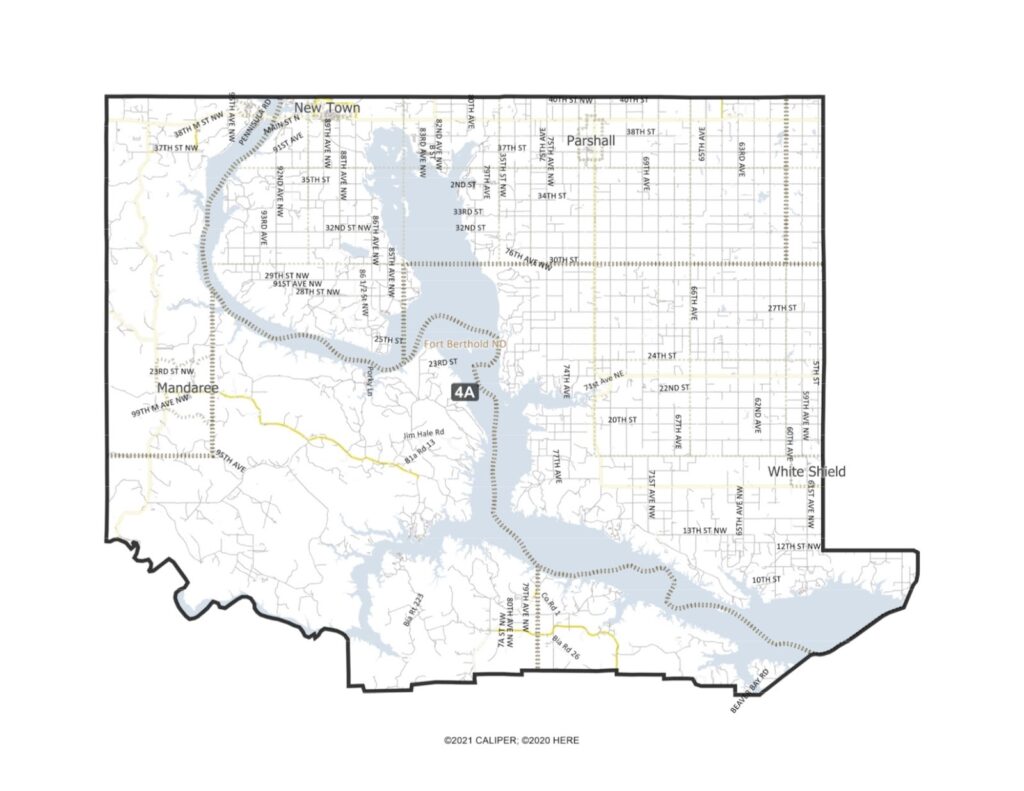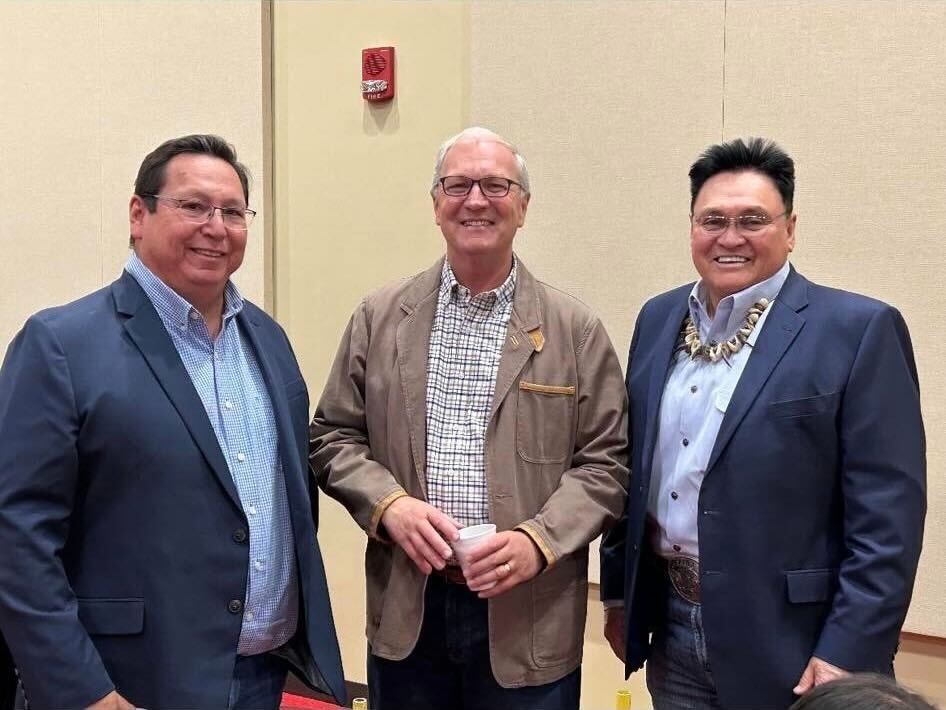
Despite not winning the District 4A election, Ron Brugh has been asked by the state Republican party to support them in various endeavors, including a civic engagement election literacy event. Pictured right is Brugh at a Kevin Cramer senator campaign event at the Four Bears Casino earlier this month. (Photo courtesy of Lisa Finley-DeVille)
The two Mandan Hidatsa and Arikara Nation contenders achieved a common goal in the North Dakota state representative race for the newly formed District 4A: higher voter participation. Mapped in 2022 after a hard-fought battle for Native vote parity at the polls, the district conforms closely to the boundaries of the Fort Berthold Indian Reservation.
Altogether the candidates drew 2,559 votes, 700 more than in the 2022 race.“That’s huge, that is, compared to what our reservation gets,” candidate Ron Brugh told Buffalo’s Fire.
Incumbent Lisa Finley-DeVille won 64% of the vote, to Brugh’s 36%, according to the North Dakota Secretary of State. Both are citizens of the Three Affiliated Tribes.
Finley-Deville, a Democrat, plans to put forward 15 bills related to the environment, economy, public safety, social issues and more. She also intends to establish a Native center for displaced families in Bismarck. To boost the Native vote, she is developing a statewide curriculum for high school students, focusing on how candidates receive endorsements and how to run for office.

“I will work to ensure that our voices are represented in state legislative processes and help us develop policies that protect our unique rights, traditions and needs,” she said in a Nov. 11 media release. “I will work to foster collaboration between state and tribal governments to ensure our communities’ voices are heard and included in critical legislation.”
Back in 2020, lawmakers split District 4 into 4A and 4B as a result of the U.S. Census. Finley-DeVille became District 4A’s first representative in the 2022 North Dakota election. According to Ballotpedia, she had 69% of the vote, while Republican candidate Terry Jones had 31%.
Brugh emphasized a generalized lack of election literacy. The War Pony Energy CEO shared that several people approached him, asking if they could vote for him even though they were registered with a different political party.
“Yes, you can vote for anybody you want or any issue you want,” Brugh said. “The good thing about it is that they voted, the bad thing is that they don’t know the difference between what Republicans represent and what Democrats represent.”
Moving forward, Brugh is continuing to make plans for his involvement in politics. The state Republican party recently asked his support in various endeavors, including a civic engagement election literacy event. The goal is to “educate our people so we understand policies rather than looking at red or blue,” Brugh said.
Brugh thanks his supporters for taking the time to come out and vote. “It’s pretty cool to have about 2,500 voters voting,” he said. “That to me is a very positive step. We as Native Americans have always been reluctant to get up and speak up for ourselves. The road to enhance that is to help proceed on.”

Finley-Deville expressed gratitude to her supporters and agreed with Brugh on the importance of American Indian involvement in policy and legislation.
“For centuries, decisions have been made on our behalf that do not benefit our communities,” she said in a press release. “The intersection of state and tribal laws is critical for creating a just and inclusive society. This is where the sovereignty of our tribal nations meets the authority of state governments, and it is essential that we navigate this relationship with respect and understanding.”
She also thanked Brugh for running in the 2024 race. “It takes a lot of courage and work to run a campaign to inspire people to support your candidacy,” Finely-Deville said.
The District 4A representative looks forward to serving her constituents again this winter. She hopes to see more participation from residents in the future.
“When I return to Bismarck in January, I hope that I will hear from you, my constituents, on issues that matter! I also hope that I can count on you when it comes to rallying for testimony and your expertise in the law-making process. It is up to us to shape the world that we want to see.”
Legislative District 04a Results. North Dakota Secretary of State. (n.d.-a). https://results.sos.nd.gov/ResultsSW.aspx North Dakota House of Representatives district 4A candidate surveys, 2022. Ballotpedia. (n.d.). https://ballotpedia.org/North_Dakota
Adrianna Adame
Former Indigenous Democracy Reporter
Location: Bismarck, North Dakota
See the journalist pageTalking Circle
At Buffalo's Fire we value constructive dialogue that builds an informed Indian Country. To keep this space healthy, moderators will remove:
- Personal attacks or harassment
- Propaganda, spam, or misinformation
- Rants and off-topic proclamations
Let’s keep the fire burning with respect.







